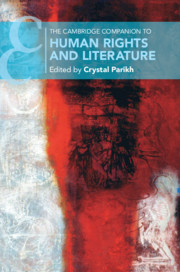Book contents
- The Cambridge Companion to Human Rights and Literature
- The Cambridge Companion to Human Rights and Literature
- Copyright page
- Epigraph
- Contents
- Notes on Contributors
- Chronology of Major Works and Events, 1215–2018
- Introduction
- Part I Genealogies and Contexts
- Part II Fashioning Methods
- Part III Generic Representations
- 9 Narrating the Human Person
- 10 The Dramas of Human Rights
- 11 Poetic Justice and the Idea of Poetic Redress
- 12 Truth-Telling
- 13 Visualizing the World
- Part IV Writing Human Rights
- Select Bibliography
- Index
- Cambridge Companions To …
12 - Truth-Telling
Reportage and Creative Nonfiction
from Part III - Generic Representations
Published online by Cambridge University Press: 24 June 2019
- The Cambridge Companion to Human Rights and Literature
- The Cambridge Companion to Human Rights and Literature
- Copyright page
- Epigraph
- Contents
- Notes on Contributors
- Chronology of Major Works and Events, 1215–2018
- Introduction
- Part I Genealogies and Contexts
- Part II Fashioning Methods
- Part III Generic Representations
- 9 Narrating the Human Person
- 10 The Dramas of Human Rights
- 11 Poetic Justice and the Idea of Poetic Redress
- 12 Truth-Telling
- 13 Visualizing the World
- Part IV Writing Human Rights
- Select Bibliography
- Index
- Cambridge Companions To …
Summary
Traditional investigative journalism maintains a commitment to neutral objectivity, but the genre of creative nonfiction, in which writers are deeply immersed in complex and rapidly shifting social and political conditions, has proven to be one of the most durable genres of human rights literature. On the one hand, reportage often enjoys the documentary authority of the first person observer. However, the intensely personal relationship of the writer to his or her subject also entails vexed questions of how they represent the experiences of human rights subjects (whether victims or survivors), the usually uneven structural relations of power between the writer and subject, and the ethical good or harms enacted by the representations themselves. This chapter turns to reportage and other first-person documentary prose, including Human Rights Watch press releases, Addario’s The Forever War, and Angelina Jolie’s Notes from my Travels to examine both the appeals and difficulties the genre poses for representing human rights victims and struggles.
- Type
- Chapter
- Information
- The Cambridge Companion to Human Rights and Literature , pp. 167 - 177Publisher: Cambridge University PressPrint publication year: 2019
- 1
- Cited by

